History of Headquarters Company - 346th Infantry
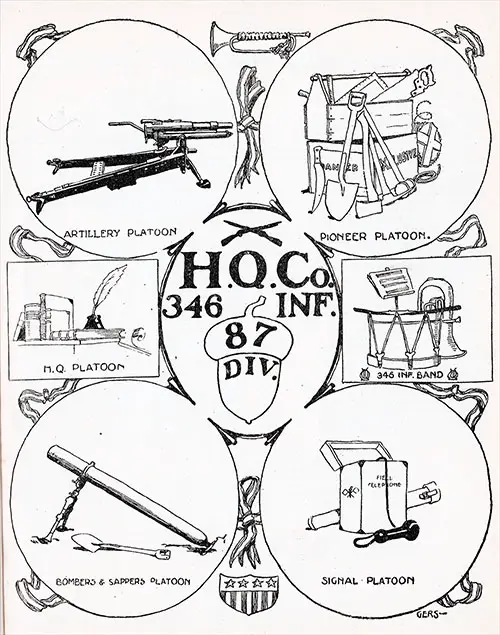
Title Page, Headquarters Company, 346th Infantry, 87th Division, American Expeditionary Force, 1919. GGA Image ID # 133d645846
History and Roster of Officers and Enlisted Men of Headquarters Company, 346th Infantry, 87th Division, AEF. Glancing through it, we find many familiar names that we will probably always remember.
Listen boys and you will hear
A little story of our career.
Hardly more than a year has passed
Since Kaiser Bill Said, “GO to Grass”.
But as I write the war is won
And Bill himself the arrogant Hun
Can only sit and cry “Alas” ?
Why did I tell them, “Go to Grass”.
Back in November of Seventeen
We all assembled at Camp Bike green.
Out in the sun on the side of the hill,
We grubbed stakes and rocks As well as drill.
Squads right and left, one, two, three, four,
We did until our feet were sore,
Knowing well what Sherman meant
When he gave his idea of war.
Out of the cause the Three Forty Sixth,
Up and ready with the Hun to mix.
Then in June the order came;
Roll up your packs and we'll entrain.
So we left old Camp Bike.
Picked up new men and then began
Squads rights and left over again.
Reviews, reviews and more reviews,
Until one day there came good news.
At last, at last were going to fight
To find out whether might is right.
So off for France to take a chance
With Kaiser Bill and make him dance.
We sailed away one August day
From New York Harbor, U. S. A.
For twelve long days we sailed the sea
Guessing how far that land could be.
Our sleep was light, our cats were slim
But still we held our same old vim.
Until one day we sighted land
And then there came the old command,
Sling equipment, Forward march,
One, two, three, four, what a lark.
Through Liverpool in Old England
We marched to music of the Grand Old Band
Up at the depot at a Red Gross stand
They gave us coffee and a welcome hand.
Across the country and channel too
We went with just one stop
At Winchester to take a rest
And a mighty welcome flop.
At the Camp in old Le Havre
We marched and sweat and almost starved
But still we held our same old pep (get)
That we had worked so hard to)
And then one day we rolled away
In side door Pullmans (only in name).
For two long days we hit the track
Until we landed at Rouffiac.
T’was a little town in a peaceful land
With plenty of wine and a welcome hand.
We stayed a week then took a hike
To Saintes, nine miles ’long a crooked pike.
From there we hit the rails once more
For a brand new camp they called Montoir.
“A working camp” the Captain said
To make us tougher than German lead.
And work we must and work we did.
Too heavy to carry? Well, use the skid.
For the shells must go up to the front
To whistle and scream and make Bill grunt.
Living conditions were not the best.
Worked seven long days without a rest,
But what cared we, so the war progressed.
Day after day we worked away,
Expecting to hear the Captain say,
“Come, Sling your Backs” the time has come
To help and make the Germans run,
But those few words have never come
The war is o’er, the light is won,
But still we know we did our best
Though not up there beside the rest.
Soon back to the land and home of the free
The 346th expects to be.
Up Broadway of this welcome land
We’ll march to the music of the grand old band.
In after years, when you read these lines,
Remember the tent and its good old times;
The Battles you fought, that came to naught,
And the good old 346th.
While the Company Commander was making a Speech in the Mess Hall one evening the following conversation took place;
Pvt; A question Sir ?
Capt; Certainly, what is your question ?
Pvt; Do we have to take our packs through the Decootieizer.
Capt; Have you the cooties in your pack too ? - I did not think they wandered so far away. Possibly you might enlighten yourself on that subject by consulting Sgt. Wickliff of the band.
“Looking Backward”
In looking through the old files of Headquarters Company, 346th Infantry, we happened on the first muster roll of the organization. In glancing through it we find many familiar names, names that we will probably always remember, some with pleasure and others perhaps with regret, for it has been impossible to keep track of all the old members on account of transfers, deaths and other reasons.
At the head of this first muster roll, which dates October 31st, 1917, we find the following officers:
- Captain: Ralph B. Butterfield, Commanding Company
- Captain: Vincent M. Miles, Reg. Adjt.
- First Lieuts. Joseph H. Brown and William A. Thompson
- Second Lieuts. Hugh E. Woodward, Scott D. Hamilton and Gervas T. Blakely
Before going any further with this review, it would not be amiss, perhaps, to say a few words about the above officers, the men who made Headquarters Co., and in fact helped to make the 346th Infantry, the best organization in the 87th Division.
- At the time of which I speak Captain Ralph Bradbury Butterfield was in command of the company, the hardest working and most respected and best liked officer we have ever come in contact with.
He was a man’s man in every sense of the word, and a man that we-will always remember for his interest and kindness to the raw recruits placed under him, to start their military careers, and one has only to look at the men who received, you might say, their initial training under the strict discipline of Captain Butterfield to know that he was a leader of men.
He was a disciplinarian and at times seemed too harsh, but at the same time was his men’s best friend, kind and gentle and always ready to give good advice and assistance to all, whether along military lines or personal business and while it was with regret that we received word of his appointment as Major, we took a great pride and pleasure in seeing him assume his new duties as commander of the Second Battalion.
It always makes us proud and glad to hear “Old But” as he was affectionately nick-named, snap out his commands. I want to say to you all sincerely, that had we ever the opportunity of going against the Germans they would have been, as “Old But”, used to say, “Blowed up Peckerwoods”.
I know that I will not be wrong in speaking, not only for the men of Headquarters Co., but also for the entire regiment, when I say that we all wish the Major a long, happy and prosperous life and hope that we may have the pleasure of meeting him after our return to civil life.
- Next, comes Captain Vincent M. Miles who was at that time Reg. Adjutant. We in the company did not get very well acquainted with Captain Miles as he very seldom came near the company on account of his regimental duties. Along the middle of February, 1918, he was transferred to the position of Aide on the staff of the 39th Division, then located at Camp Beauregard, Alexandria, Louisiana.
- Next, comes First Lieutenant Joseph H. Brown at one time our Intelligence Officer. He was sent to the 173rd Brigade Headquarters as Aide to Brigadier-General Van Vliet, where his knowledge of military matters as well as his pleasing personality soon won him an appointment as captain and his return to the regiment as Regimental-Adjutant, which position he now holds. We all know that Captain Brown’s heart is with the men, that he is always doing everything he can to improve conditions for us and we like to see his smiling countenance around the regimental and company area.
- First Lieutenant William A. Thompson is another officer that very few, if any of us, ever knew as he was placed on special duty with the 87th Division Headquarters and that was the last seen of him. However I have heard from time to time that he was keeping up the reputation of the Headquarters Company of the 346th Infantry and was making good wherever placed and we wish him success and good luck wherever he may be.
- Second Lieutenant Hugh K. Woodward is next, one of those real Southern boys who is quite different from the type of officers encountered in the northern camps, and who shortly afterward was called “Sister” by all the men. This name was not given as a slam and we trust that it has never been considered as such. Lieutenant Woodward was in charge of the Signal Platoon and anyone who has had any experience in signal work can readily understand the troubles he had wished on him.
Then also I ask you to take into consideration the fact that he was given a lot of recruits commonly called “Hay Barbers” and “Sod Busters” and expected to make of them efficient signal men. After months of hard work and worry without ever having a chance to see the fruits of his efforts, he was transferred on November 29th, 1918, while on duty in France to the First Depot Division, and is now probably with the Army of Occupation somewhere along the German boundary.
It was with deep regret that we saw “Sister” leave the company for all of us enjoyed hearing his southern dialect and stories of his experience in the South. He left us with the best wishes of each and every member of the company.
- The roll then shows Second Lieutenant Scott D. Hamilton, who, I will mention again through hard work and earnest efforts received his reward on January 1st, 1918, by being appointed a First Lieutenant, and who also through his ability as a runner and jumper over the hills and rocks in the vicinity of Camp Pike, earned the sobriquet of “Jack Rabbit” while chasing that elusive little animal. Lieutenant Hamilton was placed in charge of the Artillery Platoon.
I have never been able to figure out the reason for this particular assignment, but from a remark made by the Lieutenant after his return from a special school, where he had the pleasure of dragging 37mm, or one-pounder gun over the hills of France, am inclined to believe he was given the assignment on account of his husky build and great strength.
It is to be regretted that we were unable to secure a photograph of the Lieutenant while at the above mentioned exercise to place alongside a picture of him while driving his 100 H.P. Underslung Ford Chariot in which lie was a menace to peace and the War Risk Insurance Bureau, when burning up the road to Little-Rock, Arkansas.
I am mighty glad to say that we still have Lieutenant Hamilton with us, for he certainly helps to make life worth living in camp, always looking out for the men and dong things that are appreciated by all. I know that after we are back at civil life our thoughts will often drift back with pleasure to the time we spent with him, and he has the well-wishes of all the men in the company.
- The last name appearing on the initial list of officers is Lieutenant Gervas T. Blakely, a big good-natured foot-ball boy from Arkansas, who was named, on account of his preference for old clothes, “The Bum”. The only time Lieutenant Blakely was excited is when lie got mussed up in bayonet training. Also the Lieutenant showed a preference for the fair sex and we get it from some of his brother officers that he could “Shake a wicked leg”, at Atlantic City.
While in Rouffiac Lieutenant Blakely formed a close friendship with a Little Padre and could generally be found with the Reverend Father following in his wake. We hated to see Lieutenant Blakely leave us, but he was transferred to the 26th Division of the Army of Occupation and we trust that he will get the opportunity of seeing a great deal of Europe before his return to God’s country.
- Along in December 1917, Lieutenant Cecil G. Smith was assigned to Headquarters Company. Lieutenant Smith is a product of Mississippi and could always give us the latest war news as well as the latest dope on baseball and was himself a past master of the great American game. In fact it was rumored that on the way from Camp Pike to Camp Dix, he tried to play said game while thinking of something else and on coming too found he was out considerable pewter.
However, be that as it may, he was called “Brother” and certainly was a brother to all. While out in the trenches at Camp Dix with his Pioneer Platoon and the Sappers and Bombers, he kept the spirits of the men up by his kind words, and his smiling countenance is greatly missed by all.
Lieutenant Smith was transferred while in France, and no one seems to know to what Division he went but is an assured fact that wherever he goes he will form friendships that will be lasting, as with those formed in this company.
- Next in line came Lieutenant John P. Youmans better known as “The Flea” or “Johnnie”. He was assigned to the Sappers and Bombers Platoon but on account of other work did not get much chance to carry on with them. He was disappointed at not being able to get to the front and I can assure you that what he Jacks in size is more than made up in sand and grit. Several times we tried to get the Lieutenant to favor us with a solo, for he is some “whistler”.
The Lieutenant enjoyed a leave while in France which was supposed to Have been spent in Nice, he also dropped in several other places too numerous to mention. “Johnnie” will live long in the memories of us all.
- Captain Keith T. Stackhouse was the last officer to join the company, receiving his captaincy May 31st, 1918, and being assigned to Headquarters Company on June 2nd. At the time the Captain took command everything was disorder on account of preparing to move to Camp Dix, However under his careful guidance everything ran smoothly, and the move was accomplished without trouble.
While at Camp Dix we received quite a number of recruits bringing the company up to full strength and it is only through the untiring efforts of the Captain that the re-organized Headquarters Company is the efficient organization of to-day. He is a man who has the interests of his mail at heart, is always looking for a means of making life “in the S.O.S.” more pleasant for the men.
The Captain was appointed to organize a regimental vaudeville show and if any of you readers have ever had any experience in trying to produce a show you can realize the worry, strain and tension under which the Captain is working. However the show is going great and bids fair to be a big success. The Captains troubles are about at an end except getting the Outfit back to the States, and when the end of our service comes we will take with us a pleasant memory of the times spent under the command of Captain Stackhouse, and if we ever drop into Tulsa, we will try and look up “Stack” and talk over the days spent in the mud of Montoir.
For Sale or Exchange
- Cork Tip cigarettes for, cognac. — Lt. Gervas T. Blakely (Rouffiac).
- Regular Army Dzadon, Physical exercise in 72 counts, It’s for the neck and its good for the neck.
- If Sgt. Rum’s sense of smell was as good for beer and sauerkraut as for rum, he would have made a good scout at the front.
- Officer: Have you been drinking any to-day ?
- Pvt: No, but if you want a drink, I can buy you one.
- Podrasky: How did you know that I was in that trench ?
- Mc Farland: Why anyone could see that hook nose way up at the fourth turn.
- Corp. Cox: If it wasn’t for Dick Fleming’s mustache, he’d be unbearable.
- Fleming: That’s alright but I didn’t have to dye mine to make it show up.
Signal Platoon
“Halt ? who’s there ?“
“A friend of Cognac".
“Advance Sergeant Sandberg”.
Anxious moments. — Sitting two seats ahead of the “Old Man” in the Liberty Theatre during quarantine.
Of all the men from little old Ireland — the most feared of all was Top Kick Mc Farland.
Favorite sports? Camouflaging stoves.
Laughing at the bugler when you’re marked quarters.
When Slim Venard was reduced from Brigadier General to the wood pile.
Memories still linger of a certain sergeant who being a great hunter and not having a shot-gun resorted to his faith full forty-five to dispatch a few innocent wild ducks, harmlessly swimming in the frog pond behind the camp. It was the morning after the night before and the sights naturally appearing very hazy he drew his famous fowling piece so close to his eye that the old gat reared up and kicked him, and all the boys wondered where he got the black eye.
The man they call Nikolai but whose eyes resemble the size of dimes rather than nickels says, “I held two yacks and a yoker.”
Lieutenant Woodward drilling the Signal Platoon.
Forward — March,
Hup, Hup, down on your but Rodell,
Hup, Hup, eyes off the ground Savage,
Column left march-Hup, Hup, get in step Corey
Dress up your squad Waldron
Hup, Hup, change step Torrens, in on your butt Gallagher
Squads, left march — hold that pivot Thornquist
PIup, Hup, Company — halt —
Corporal Appelwick and Rooney, you all take your squad out Saturday afternoon and drill them. Dismissed.
Lieutenant — What is your name ?
My name is John, I have a brother named Frank, they call me Red.
If this is sunny France what is meant by darkest Africa ?
After the band, the working detail will eat first.
“How many men have you?” a Lieutenant loudly cried,
Forty privates, 4 non-coms, and one sergeant Sir old boy Ding replied.
If we have any further trouble with this working detail, we will discontinue the issue of candy.
Just as soon as we found out we were not going home by Christmas Pvt. Kelly immediately sought the assistance of Pvt. Wolgast in filling his loan bank.
The entire signal platoon is unanimous in wishing that someday Pvt. Reynold will be able to open that other eye.
Every soldier should be the possessor of Pvt. Reynolds book on health and how to keep off of fatigue.
It is safe to say that Cpt. S. Waldron and Rebman will never tolerate any rats or mice in their basements in Civil life if there aren’t any 2nd Louies living next door.
“Hank” Rost is the only man that was accompanied “Home” by a Colonel. Hank made such an impression on the “old boy” that he made him boss of the incinerator for 30 days. Lucky Hank you didn’t get two thirds of two months’ pay.
The second day in Rouffiac France, Lt. Youmans asked a Pvt. if he could find him some water to drink. The Private examined 45 canteens and to his astonishment found every one full of “Vin Blanc”.
Photographic aspirations struck Pvt. Fjell (The Silent Knight) one day but before they had a chance to mature, they were brought to an abrupt halt by a very nice Sgt. of the Engineers.
The famous sixth squad Engineered by Corp. Rooney was the only squad that probably possessed a “dog robber”. Three cheers for Pvt. Win. Brown who performed his duties wonderful and acquired much skill in the noble art of “DOG ROBBING”.
Speaking of “Top Kickers” the following epitaph would be fitting for their headstones “Here lies the truth, because it never came out of him”.
A very difficult problem confronted Cpl. Spicer one day in this way;
He had a detail of twenty men working for the engineers. They were carrying parts of airdromes or most commonly called barracks. He could get only eighteen men on each piece and he was trying to figure how to use the other two men. In ten minutes he was also trying to figure where the eighteen men were.
The Thirty Six states that voted to ratify the prohibition bill of the U.S. Shattered Sgt. Rum’s dream of his snake garden.
When the writers of history congregate and finish their task, we hope they don’t mention the fact that Hqrs. Co. had one man who couldn’t make the degree of K.P. (Kitchen Police) (Sgt Griffith).
Our Top Kicker Landers has become a master of languages. He can now say “Yonkey” in nine different tongues. He also has a sense of smell, equal to any canine. All the cooks had to do in the morning to call him is to start frying a “T” bone and he is present in an instant.
Mechanic Red Turnblom has perfected and patented a very useful article, for Sargent Digman’s personal use in civil life. The machine is designed to prevent his ears from flapping the dishes off the table while eating.
THE PIONEER
Did you ever hear the story of the soldier, khaki clad,
Who combines both infantry and engineer;
Who is out in any weather, be it good or be it bad,
He’s the old original hard-shell “Pioneer”?
He’s the lad that makes the trenches deep, through which his pals advance,
And the one who makes the dug-outs in the rear ;
He’s the one who builds the parapet upon the firing trench,
He’s the old original hard-shell “Pioneer”.
He’s the lad who steals out o’er the top when evening shadows fall,
And when shot and shell are shrieking far and near ;
lie’s the lad that’s putting up the wire and smiling at death’s call,
He’s the old original hard-shell “Pioneer”.
And when old Father Time steps ’round to make his final call,
He’ll grasp the hand of one with conscience clear ;
He’ll meet a lad who’s all true blue, a lad who’s pal to all,
He’s the old original hard shell “Pioneer”.
The Battle of le Cootie
It was in the month of December 1918 that the second squad of Pioneers after a hard day of fatigue were lying on their bunks and thinking how they could enjoy a good warm fire and a comfortable bed, for as you know, it meant Court Martial to be caught with a stove in a tent.
Before night was over a terrific storm had blown up and the rain came down in torrents. We surely were glad that we were in a “dry” place and resting peacefully when all of a sudden there was a crashing sound, and the lights went out. Private Phillips quickly jumped for the flashlight which he received in his Christmas box and pointed it to the top of the tent. Behold the flap had blown off and through it the cooties were coming by the thousands.
We jumped up quickly, grabbed our rifles and bayonets and fired away at them as fast as we could pull the trigger. When our cartridges were low, we fixed bayonets and fought only as American soldiers can fight. It was a short but snappy fight, and the cooties were lying about in large numbers.
It was the most trying event in the history of the second Squad and one long to be remembered by those gallant warriors. Three truckloads of dead cooties were carried to their final resting place the next morning.
A private came into the supply room one night. It happened to be aviator, otherwise known as Pvt. Jenczewski. He said, “My Platoon leader Sgt. Ostrum, he came into my tent one night and sat on my bunk, and now I ain’t bothered any more with cooties”.
Here They Are
We’re a bunch of Uncle’s lads the Pioneer Platoon,
We do not use Artillery or Wigwag at the moon.
Nor do we use the mortar, nor do we music play.
Were just a bunch of average lads from good old U.S.A.
First, there’s Good Old Two by Four (Sgt. Ostrum), Erikson, and Cpl. York.
Spicer, Wakeland, Kliest, Podrasky, Greenan, Griff and Corke.
Then there’s Charlie Anderson, and Anderson from “Cope”,
Bauman, Brizendine, and Barrows next come in this dope ;
Then Bednarek, Booker, Claydon, Coville, Grary too,
Danner, Joe Dombrowski, Danke, Danzero Andrew ;
Fortunato, Fricke, Galen, Gersbacher are next,
Gunther, Haggblom, Hasenohr must all come in this text.
Halverson, Jenscewski, Hiester, Jansen, and E. Hobbs,
Kane and Kittle, Joe Krugielka, all are on the job.
Kettig and Kruszinski ; then we have Uelonck J. Lewaudowski, Moosbrugger, and Nuernberger A. Phillips, Rehbein Walter, and Sabava from St. Paul.
Then there’s Siefert, G.B. Stemler and we have them all.
Sappers and Bombers
We were organized to fight with the Trench Mortar and at one time we were so fortunate as to have one of our own. This was while we were at Camp Dix, but the right of possession held good only one week. After that time, our gun was turned over to another regiment of the division and we again resorted to our old wooden models.
Since arriving in France the Trench Mortar has been only a remembrance. The Sappers have sapped for the Engineers and the only bombs thrown have been sacks of flour and sugar for the Quartermasters. However if work has anything to do with winning this war, we can certainly feel that our platoon in the S.O.S. has helped bomb the way to victory.
One of these days we are going home. Then once more Bill Fincher will be able to cut the corners of the home plate. Swanson can start in to raise little swedes back in Minnesota. Digman can give himself physical exercise and “Sling Klipment” until he is blue in the face.
Brandstatter and Kid Modica as champion wrestler and boxer of the A.E.F. Perhaps Corporal Johnson can get a job some place where talking and quick movements are prohibited. Then Humphreys can pick up weight, look prosperous and live a life of ease once more. Corporal Mc Cauley can get his luminous dice and put in overtime without fear of Taps. John Tintori once more can sing his song of love to the little Italian girl back home in the States.
One might go on forever prophesying good things for the soldiers of this platoon, but space is limited. In closing rest assured that the expression “Good luck and prosperity applies to everyone.
Sgt. Swanson : Hey there close that door. Where were you brought up, in a barn ! Pvt. P. Collins. Yes, and every time I hear an ass bray it makes me lonesome.
“To Lieutenants Hamilton and Youmans”
Here’s to Lieutenant Hamilton,
Who was schooled at Fayetteville.
Somewhat of a popular lad,
But Gosh ! how-lie can drill.
Of times when in a mirthful mood,
We have things pretty swell,
But if he isn’t feeling good
Oh my ! How we catch hell.
“Squads right about” you hear him shout,
With a voice that’s clear and strong.
“Pick up that step and show some pep”,
And lie’s right there all day long.
With all of that he isn’t bad,
In fact lie’s a regular boy
And in days to come when the war is done,
We wish him every joy.
Now one more word lest we forget,
Our, “Rabbit hunts at Pike” ;
He loved this stuff, this lad from Fayette,
Fond memories we all so well like.
To Lieutenant Youmans who hails from Fort Smith,
Whose commands are so sharp and snappy,
We wish him much joy, health and wealth
And may he always be happy.
For while at Camp Dix it was dusty and hot
And shade trees were always so handy, ,
He would drill us a while and then with a smile,
Say fall out. Oh yes ! he’s a dandy.
We would all sit down on the cool green grass,
Light up and enjoy a good smoke
And often the boys would laugh with real joy,
When some fellow sprang à good joke.
And when time to renew our hot tiresome work,
We were ready and raring to start.
Which all goes to show if you treat the men right,
They are with you and will never loose heart.
In behalf of the bunch let me say this,
You have acted a man and so now,
As a sort of farewell I shall be pleased to tell,
To be ail Officer you certainly know how.
Sergeant William A. Fincher
Entertainments
It must not be forgotten that Headquarters Company gave two big shows while overseas. One was given the night before Christmas and the other on New Year’s Eve.
It is to be regretted that the program for these two events cannot be published due to lack of space.
Our first party was a howling success. With a little managing we secured a vacant building near camp and within a short space of time it was transformed into a bower of Christmas cheer and beauty.
Boxing, wrestling, singing, dancing and music were features of the program. Towards the midnight hour hostilities came to a halt and the Christmas packages were given out. Then Old King O’Brien appeared with doughnuts, coffee, candy, and smokes and our first installment of Christmas was over.
Our New Year’s party was no less a success. Again we wrestled, boxed, danced and made merry until the hour glass of time proclaimed another child of the world-the New Year 1919. In the early hours of January 1st, 1919, we eased back to our tents thoroughly satisfied with our goodbye party to 1918, and hello reception to 1919.
A Story of a Near Fishing Party at Brown s Mills
One pleasant Saturday Afternoon in July at Camp Dix, Sgts. Mc Kay, Luth, Davin. Better and Pvts. Rodell, Elmquist, Peck, Shover and Cpl. Feirer rolled their packs and head themselves to, Browns Mills for a fishing party.
They bivouacked for the night on the edge of a lake. Part of the crowd attended a dance nearby. Pvts. Bodell and Harry Shover commandeered a Hudson Automobile and one suit of boys clothes and went in quest of wild spirits, returning about midnight. Two trips with a row boat brought the cargo of spirits to its destination.
The rest of the party who were out tripping the light fantastic, having returned, the real festivities of the evening commenced.
The Jazz orchestra tuned up both inside and out, and the sweet harmony of discord, blended with the childish tenor of Harry Shover, and the Mezzo Soprano of Sgt. Davin soon floated out on the early morning air.
While Chopin’s funeral march was being played, Sgt. Mc Kay was beating time, very lightly, with a lantern, on something which resembled wood but which he afterwards found out was Sgt. Davin’s head.
King Spirit by this time having reached its final destination, and the attack having quieted down, the soldiers went to sleep among their dead comrades and numerous and sundry empties.
When the morning sun kissed their sleeping faces, they found to their amazement that someone had moved the camp, as the only covering they had was the sky overhead. They all swore they went to bed under a .shelter half, but who knows, perhaps the Magic Fairy waved her wand and the tents moved.
However breakfast was served (to a few) after some difficulty. A Bottle of King Spirit was salvaged from the ruins and was used as an eye opener, but somehow or other it failed to open one of Sgt. Luths optics, it having been kicked by a Jersey Skeeter.
Pvts. Peck and Elmquist had a lengthy and heated debate on the merits of pasteurized, criticized, and certified milk, which ended in Elmquist deciding that water was best at the same time emptying a two gallon bottle, for he had a “BIG FIRE” in his inner vitals.
This story started out about a fishing party, but Cpl. Feirer made it into a physical exercise and sun bath by starting his push and pull game. His intention was well but his condition in the morning would ' not warrant his carrying out this part of the program.
Sgt. Retter in the meanwhile had wandered off to pick “Blackberries”, but mostly to recuperate from the strenuous evening before and to empty his stomach of a few undesirable elements. Afterwards he told us he took pity on the fish in the lake, and decided to give them a square meal. This may account for the strange wobbly condition of the fish which were caught there afterwards.
“Strange” to relate this story has a very sad ending, suffice it to say that along towards afternoon we broke camp and started back to the barracks. We had such a “LOAD” that a passing Auto was hailed and carried us the remaining distance, dumping us into our bunks at twilight.
A Short Poem by Sergeant “Rum”
I’d trade my shoes for a drink of booze.
I’d trade my bun for a drink of rhum.
We sincerely hope that before the next war Lieutenant Hamilton will learn to say, “Rest” instead of a At ease” when someone calls “Attention”.
The way of the transgressor is hard. These are the words of the most faithful “Slum Eater” (Voelker) after having maneuvered in the vicinity of the kitchen wood pile and finally picking out a piece of wood that he thought would burn good, the eagle eve of Cook Sloan spied him, and Slum dropped his burden and beat a hasty retreat for his tent.
Slum says “It don’t pay to do any underhand work like that in your own company. “It wouldn’t have been so bad, but Slum had a fair reputation with the cooks and Mess Sergeant, and it was with much persuasion that he got his mess kit decorated with cats that evening.
Up to the time of this book going to press the authors know of but one case where a soldier had to go on the sick report on account of overeating. It happened in this manner. Private Humphreys was lucky to get K. P. for one day only.
Now he knew that the one dollar a day that he was getting from Uncle Sam would not be sufficient compensation for this day’s work in the slum factory. The cooks fried steak for dinner and at meal time didn’t have near enough steaks for the men. Later they discovered that Private Humphreys had devoured a good many steaks.
The cooks gathered in the Boar’s Nest (Tent) and as near as they could figure he had eaten about sixty-seven steaks, hence the shortage. The next morning a visit to infirmary and an X-ray photograph disclosed sixty-nine steaks in his stomach and three or four steaks were running up and down his alimentary Canal looking for a location. Since then the boys can’t refrain from calling him “Beefsteak”.
346th Infantry Band
We began our career at Camp Pike, Ark., in October 1917 with only eight members. Under the leadership of Band Deader Blair Yon, Now lieutenant, this small number of musicians made a noble start.
Some of you may remember the first concert, and the first Regimental Parade, played by this small bunch of “Wind jammers” During the month of November the membership was increased to twenty-five members by the arrival of musicians among the troops from Camp Dodge, and Camp Taylor.
Later several more members were added through transfer. Through the persistent efforts of Band Leader Yon, we made rapid progress, and gained the reputation for having the best marching band in the Division.
During the Winter of 1917-18 our time was fully occupied all day by rehearsals and at night with concerts at the “Y”. There were also weekly dances at the Officers Club. As soon as the spring weather would allow, Regimental Parades were held and an occasional Brigade Review and on March 11th , our whole Division passed in Review for Major General Sturgis.
Sunday concerts were given at the Majestic, Kempner and Royal Theatres in Little Rock. During the Third Liberty Loan Drive, our Band made a trip to Texarkana, to arouse enthusiasm for the Liberty Loan and incidentally we enjoyed a real time.
In June came the order to move to Camp Dix, N.J. On this trip we stopped and paraded at Poplar Bluff, Mo., Greenville, Ill., Altoona, Pa., and Harrisburg, Pa., Among the Eastern boys at Camp Dix, we were fortunate in locating a number of talented musicians and increased our membership to forty-eight. It was at Camp Dix, that Band Leader Yon received his Commission as 2nd Lieutenant. We enjoyed our stay at this Eastern Cantonment as it gave many of us our first opportunity to see New York, Philadelphia and other eastern cities.
The order soon came for our move to France and we bade good bye to the U.S.A. We did not encounter any real rough weather on the Atlantic and played a concert every day on deck, although we enjoyed the ocean voyage and very few of us became seasick, still it was a great relief to reach England and set foot on solid earth again. Our trip from Liverpool to Winchester was interesting and gave us a glimpse of the picturesque country estates in England.
Our stay at the Rest Camp near Winchester lasted only a few days, we embarked at Southampton on that eventful trip across the Channel, those waves appeared like mountains to us from the decks of the “Viper”. Before the night had passed, most of us had learned to know what seasickness meant, especially the kind and genial “Old Man Wick HIT”.
But the welcome which we received upon our arrival at Le Havre, revived our spirits. We paraded through the town to another Rest Camp. After a few days in this Rest Camp, we boarded the side door Pullmans, and traveled south to the village of Rouffiac. The Band was billeted in a Wine Cellar, but the owner had removed all the wine, probably for safety sake and our own good.
Our stay in this small village was interesting, as it gave, us the opportunity of meeting the French in their own homes and we learned their customs and mode of living. The interest was mutual, being we were the first Americans there, and were quite a curiosity to the villagers. We gave a concert each evening in the village and the natives heard jazz music for the first time and appeared to enjoy it.
Two days before leaving Rouffiac, Harry Rickenbach, a band member was sent to the Hospital with a bad ease of Blood Poisoning, from which he died three days later. The news of his death came as a shock to us all. Harry was a talented musician and we had learned to know him as a gentleman, always congenial and a true friend. We regret that it was not our privilege to be present at his funeral and pay our final tribute to his memory.
Leaving Rouffiac, we marched nine miles in the rain to the city of Saintes. The weather did not stop us from playing on this hike and helped to keep up our spirits. We loaded into box cars at Saintes and arrived the following day at Montoir, our present location.
Our various duties here have kept us busy, giving concerts at the «Y» and different camps, midnight concerts for the Stevedores at the Docks and knocking off a few tunes before daylight, for our own boys as they start in their way to work. All these and other duties, have served to keep us well occupied.
Last Christmas there came a diversion in the form of a trip to Tours with the St. Nazaire Football Team. We played a few pieces during this game played against Bordeaux.
Since coming to Montoir, our Band Leader, Lieutenant Yon has been laid up at the Hospital and recently was returned to the States as a Convalescent.
In the Lieutenants’ absence the band has been under the leadership of Assistant Band Leader Westphal, with the able and careful assistance of Band Sgt. Wickliff. As a Band, we hope that our efforts have succeeded in putting some of the Famous 346th Pep into the boys of our Regiment and helped to cheer them up. We are holding in Reserve an extra supply of wind for that happy day when we march to the Gang Plank, playing “Homeward Bound”.
And sweet smelling Librarian Cox, attracted there by the incense of Djer Kiss and Cologne. Sergeant Retter claims he found one which had a wound stripe and Sergeant Wickliff has one in a bottle which speaks French quite fluently. The Division is being split up now, and as soon as their service records can be looked over, they will be placed on detached service.
The Greatest Ambitions of our Musicians
- Asst. Band Leader Westphall, to find an anti-blushing compound,
- Bugle Sergeant Picone, to know the duties of a Bugle Sergeant.
- Band Sergeant Turpin, to commit bigamy.
- Band Sergeant Wickliff, to out-do Belasco in the show business.
- Band Sergeant Retter, to invent a cootie exterminator.
- Band Serge-ant Dickson, to drill the big-foot squad.
- Cpl. Cox, to have a valet and a million dollars.
- Cpl. Mack, to eliminate the letter « V » from the English Language.
- Cpl. Steele, to kid Bill Edmunds.
- Cpl. Swanson, to be a band leader.
- Cpl. Peterson, to race with a turtle.
- Col. Shutts, to learn how to stand reveille and still remain in bed.
- Mus. Kellogg, if the ocean was cognac to be a sailor.
- Mus. Frohnapple, to beat up Sergeant Digman.
- Mus. Wyne, to be a chaplain in an aerial squadron .
- Mus. Olson, to hold a royal flush against a straight Hush and four of a kind.
- Mus. De Falco, to obtain a discharge.
- Mus. Ohlenberg, to become a sculptor.
- Mus. Sabatino, to keep us awake with his E flat.
- Mus. Herold, to be invited to a banquet and be the only guest.
- Mus. Bossart, to put on weight and raise a mustache.
- Mus. Wood, to invent an inside toilet for an army squad tent.
- Mus. Garles, to get to the Morris chair.
- Mus. Schœneweiss, to be editor of the needle work magazine.
- Mus. Flemming, to be a heart-breaker.
- Mus. Green, to meet a certain Lieutenant in civil life.
- Mus. Leske, to be able to use all the words in Webster’s dictionary.
- Mus. Kuhlman, to find out the reason for everything under the sun.
- Mus. O Grady, to find a listener who could stag with him for two hours and still live.
- Mus. Johnson, to be a K.P. (Kitchen Police).
- Mus. Thorton, to get his uniform.
- Mus. Swanson, to learn to swear and smoke a cigarette.
- Mus. Wiley, to play “Quand Madelon” on a one-stringed fiddle to a lady friend in Minn.
- Mus. Perrott, to hurt George Wood's feelings.
- Mus. Infantino, to be the strongman in a one ringed circus.
- Mus. Jorns, to get married.
- Mus. Lampe, to be an actor and a musician and still live on the farm.
- Mus. Larson, to get home and see if the ring is still on her finger.
- Mus. Butera, to increase his stature.
- Mus. Delsardo, to be a butcher.
- Mus. Edmonds, to belong to the Intelligence department.
- Mus. Brainard, to grow up.
- Mus. Carlson, to be an Egyptian mummy in the Smithsonian Institute.
The Windjammers
By Harold Willard Cleason
They sing the praise of infantry
Which messes up the Huns.
And also of Artillery
That works the bloomin’ guns,
The Engineers an’ Cavalry
And Aviators, too,
All get their share of glory.
An’ they earn it, very true.
But there’s one branch of the service
They never think to praise,
Tho’ deserving it. by Pershing,
In a hundred different ways,
Chorus :
It’s the Wind jammers, the wind jammers,
The Regimental bands.
And its many men are thankin’ God
For some base drummers hands.
For they help to carry wounded
When the bearers ain’t about ;
When you get yours in No Man’s Land
Its « Blowhards » pull you out.
There a scraggy lookin’ outfit
Of all sizes, sorts and shapes,
And there mouths are mostly puckered
Like there eat in’ sour grapes.
But they cheer us to the trenches
Through the shrapnel, mud and rain.
An’ when our hit is over
Sure they play us again.
Chorus :
Oh, The Wind jammers, the Wind jammer
The Regimental bands.
You can see the shoulders straighten
As we pass the « Blowhards » stands,
They may not snipe the Fritzle
An’ the may not cross the top,
But when cheer stuff is needed
They keep playin’ till they drop.
Images from Headquarters Company, 346th Infantry
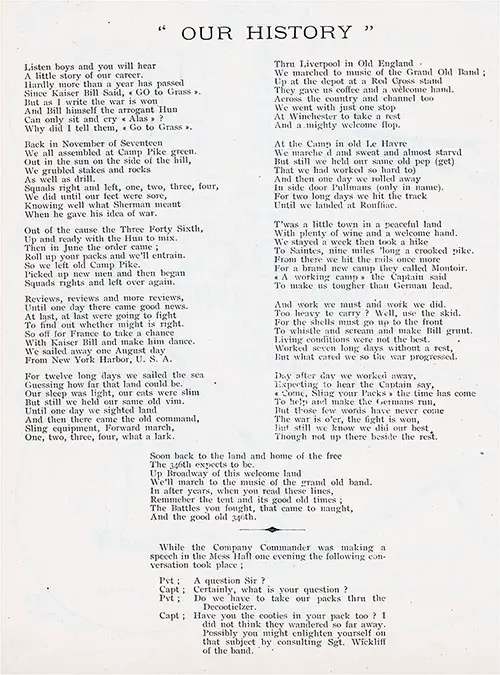
Our History, Headquarters Company, 346th Infantry. GGA Image ID # 13470c9df1
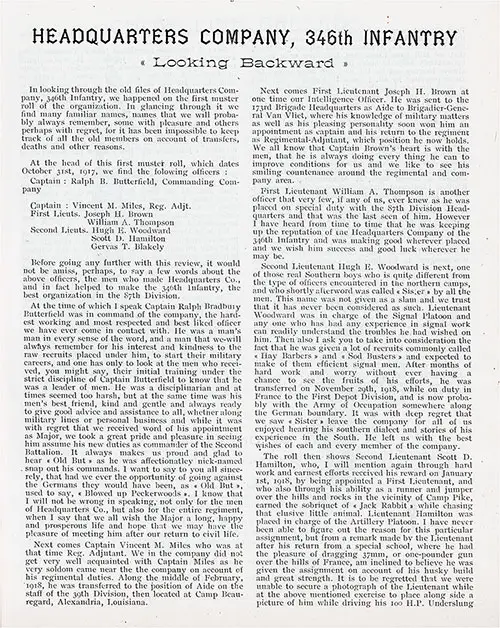
Headquarters Company, Looking Backward, Part 1 of 2. GGA Image ID # 13479e7e25
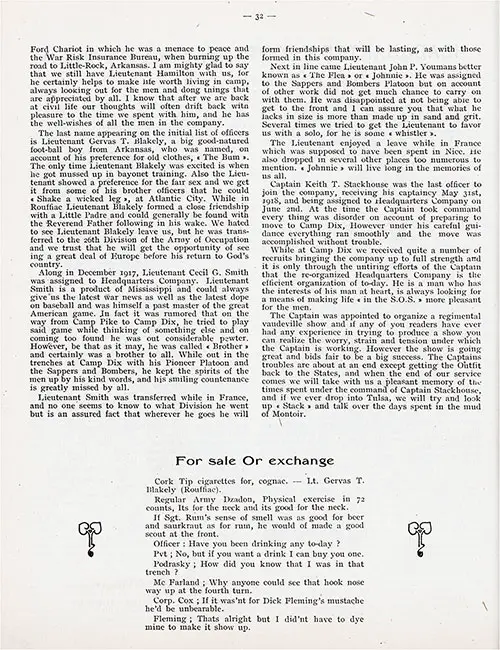
Headquarters Company, Looking Backward, Part 2 of 2. For Sale or Exchange. GGA Image ID # 134724e702
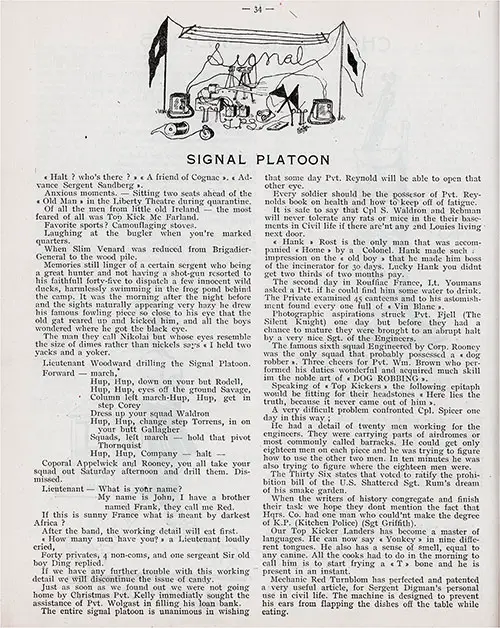
Signal Platoon, Headquarters Company, 346th Infantry. GGA Image ID # 1347a1d2b2
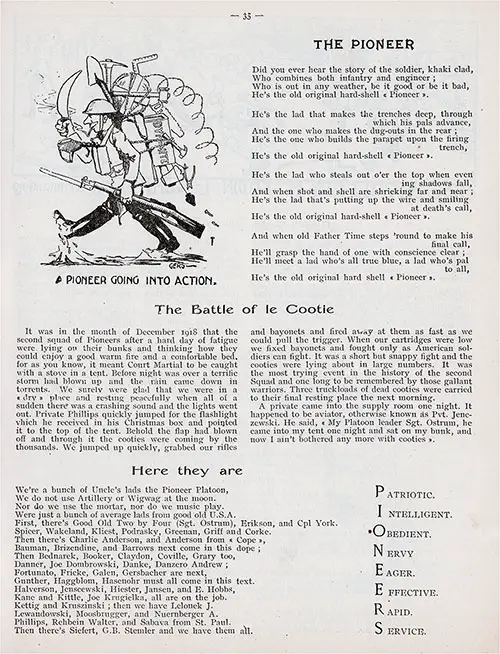
The Pioneer; The Battle of le Cootie; and Here They Are. Headquarters Company, 346th Infantry. GGA Image ID # 1347c0ad0e
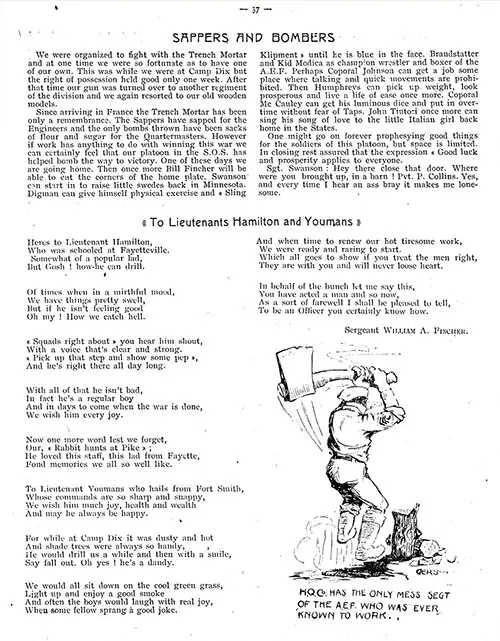
Sappers and Bombers; "To Lieutenants Hamilton and Youmans." GGA Image ID # 13483999e6
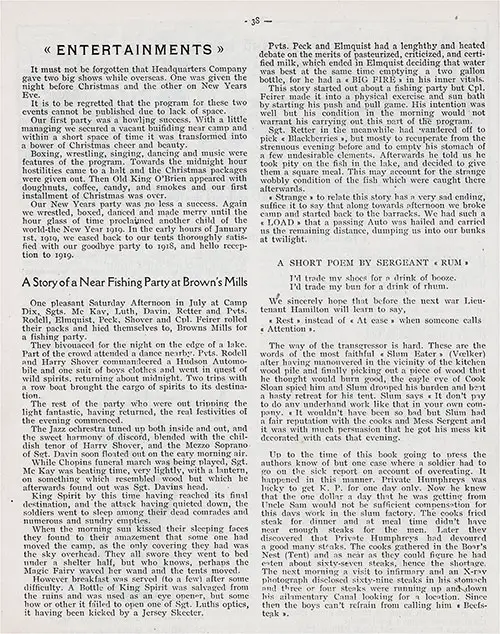
Entertainments; A Story of a Near Fishing Party at Brown's Mills; A Short Poem by Sergeant "Rum." GGA Image ID # 1348584833
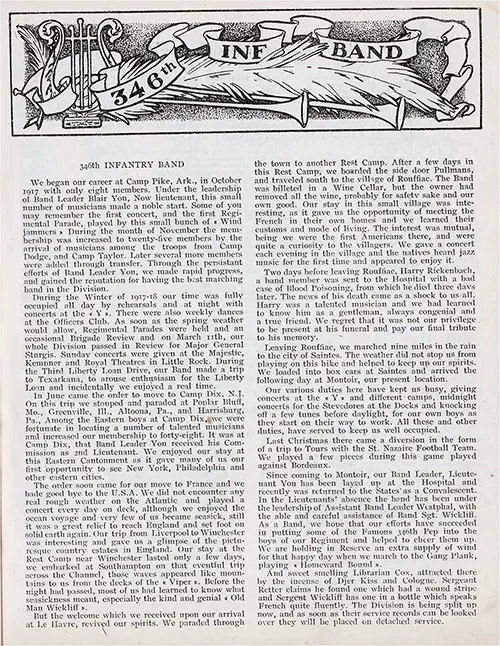
346th Infantry Band. GGA Image ID # 13486863fd
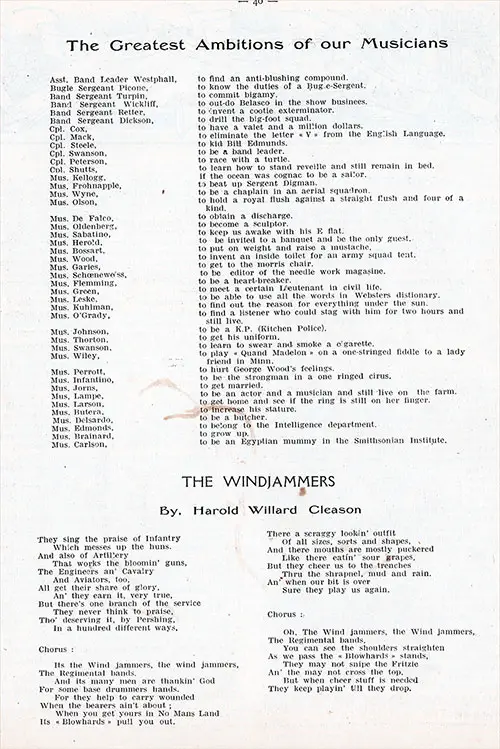
The Greatest Ambitions of our Musicians; The Windjammers by Harold Willard Gleason. GGA Image ID # 1348ae8b0c
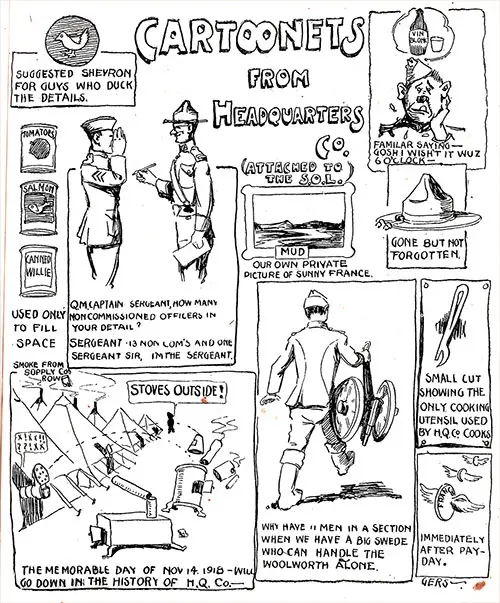
Cartoonets from Headquarters Company, 346th Infantry. GGA Image ID # 1348bf9a3b
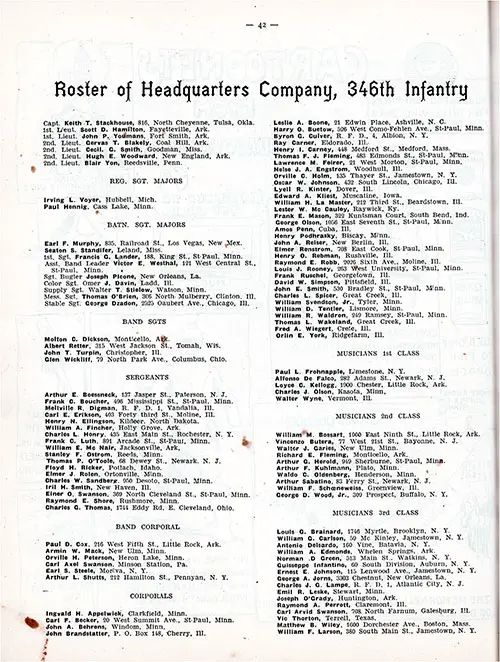
Roster of Officers and Enlisted Men of HQ Company, 346th Infantry, AEF. Part 1 of 3. GGA Image ID # 1e7251593d
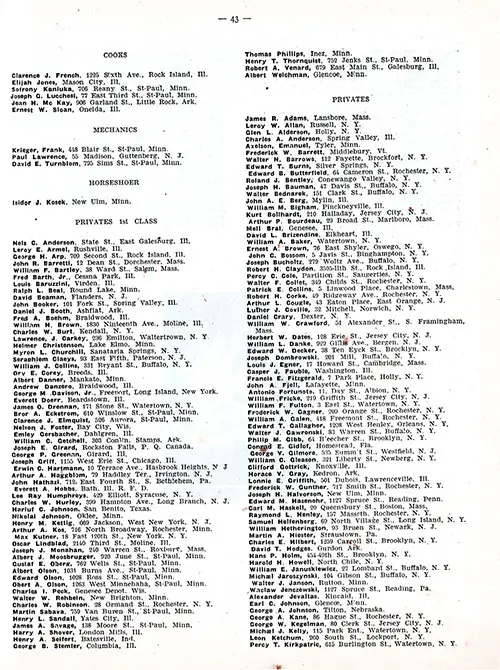
Roster of Officers and Enlisted Men of HQ Company, 346th Infantry, AEF. Part 2 of 3. GGA Image ID # 1e724f8b22
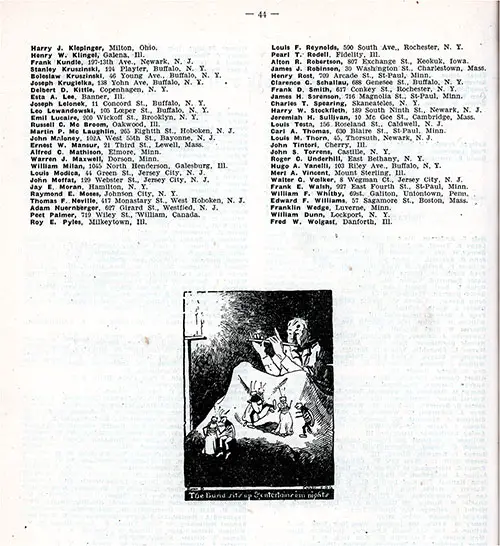
Roster of Officers and Enlisted Men of HQ Company, 346th Infantry, AEF. Part 3 of 3. GGA Image ID # 1e7252fe14
